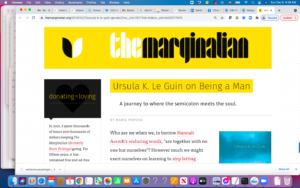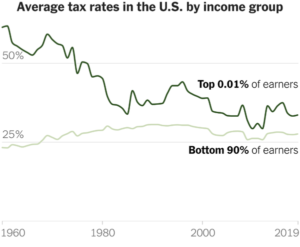Maria Popova Keeps My Heart Open to the World



For most of us in the US who are neither super-wealthy nor desperately poor, our largest financial asset is our home. And we pay annual taxes on the worth of that asset–called property tax. Here in Massachusetts, we also pay annual excise taxes on our cars and certain other kinds of property. David Leonhardt of the New York Times explains this eloquently in today’s This Morning newsletter, with lots of charts and graphs to make the data more understandable. I strongly recommend this article.
But while those whose multiple lavish mansions represent only a tiny fraction of their financial worth also pay property taxes, most of their wealth is not taxed except that portion that arrives new each year (income).
Let’s not forget that when Dwight Eisenhower was president, the top federal marginal tax rate on income was astonishingly higher than it is now: 91 percent at the top end, until it was lowered during Lyndon Johnson’s first full year to 77 percent. It’s been lowered again several times, and now stands at 37 percent, according to the Tax Foundation. President Biden has proposed a slight increase, to 39.6 percent.
The effective rate is much lower, though. Only the amount of income above the threshold for that rate (currently $628,301) is taxed at that rate. Each portion of income is taxed at the bracket for that level. So if you file singly and make $700,000 (and I don’t come anywhere near that), only $71,699 is taxed at 37 percent. The first $9950 is taxed at just 10 percent, the next $30,575 is taxed at 12 percent, and so on. This is why it is often an advantage to file jointly with your spouse–because more of your money is taxed at the lower rates. In the above example, $19,900 would be taxed at the 10 percent level, versus $99,000 if you split the income evenly and each filed separately.
Having dropped the tax rate on the wealthiest income earners by about 60 percent, the government has been considerably less aggressive about making up the difference. The One Percent used to pay heavily in the year they acquired the money–but now that they’re paying much less, an asset tax could help fund the things we really want government to do: Clean up the planet, educate and protect all its citizenry, provide services and a leg up for the disempowered, and make sure no one is crushed by the ever-growing costs of basic survival. In other words, Build Back Better and the Green New Deal. Both of these will create massive numbers of new jobs, clean up the planet, and leave the average person with more money in their bank account.
Doing these things costs money. And that money comes from taxes and fees. 16 European countries with high standards of living and high quality of life have marginal tax rates between 45-56 percent. But look what they get for their money!
In our country, we are facing an absurd situation where two Democratic Senators representing less than three percent of the total population are holding America hostage. They say we can’t afford these investments, but they also shoot down all attempts to institute mechanisms to pay for them. And an even more absurd situation where most laws can only pass with a supermajority and virtually all Republican Senators refuse to vote for anything that the Democrats support. So much for the vaunted bipartisanship Senator Manchin in particular keeps insisting on. But the American people strongly support these investments.
It’s time to turn that support into action. First, write your Senators. You can find their addresses here. Use the appropriate sample letter (or letters, if you have one Senator in each party) from the three below as a model, but take three minutes to make it uniquely your own (especially the first sentence and the last three sentences), so it doesn’t look like a form letter. Better yet, write yur own, from scratch. If you live out-of-state, don’t lobby Manchin or Sinema directly. That will be counterproductive. Instead, reach out to friends, family members, people who are in the same organizations you participate in who do live in those states. If you are a business owner, start with “As a business owner and constituent in…”
Second, get involved. Do some phone banking or text banking or postcard writing. Show up when organizations like Fairvote, Movement Voter Project, Common Cause, voting rights divisions of NAACP and ACLU, and environmental groups hold rallies, lobbying days, meetings, and presentations. Personally contact your own friends and family. write letters to the editor for publication in your local newspaper. Be an election protection volunteer.
If you live in West Virginia or Arizona
Dear Senator,
As a constituent in [your town and state], I am deeply concerned at your role in blocking an agenda that most Americans support. 48 of your fellow Senate Democrats have shown incredible willingness to compromise with your demands–but you keep moving the goalposts. It is well past time for you to find a way to support these necessary Build Back Better, Green New Deal, and Voting Rights bills that will get the job done, give the Democrats something to brag about in next year’s crucial elections, and improve lives for all residents of our wonderful state. You will have another feather in your cap if you can bring these bills into law, even if it means getting them out from under the filibuster. But you will lose local support if you keep blocking the progress we so desperately need. I am eager to vote for a Senator who has put the needs of constituents ahead of narrow corporate and special interests. Please BE that Senator.
Sincerely,
[Your name and postal/email addresses]
If You Have One or Two Republican Senators
Dear Senator,
As a constituent in [your town and state], I am deeply concerned at your role in blocking an agenda that most Americans support. President Biden came to you in a spirit of bipartisanship. Senators Manchin and Sinema came to you in a spirit of bipartisanship. 48 of your fellow Senators have shown incredible willingness to compromise with your demands–but you keep moving the goalposts. We citizens of [your state] did not elect you to be an obstacle to programs that we desperately need, just because it wasn’t the Republicans who proposed them. It is well past time for you to find a way to support necessary infrastructure that goes beyond roads and bridges, address the carbon crisis with job-creating green initiatives, and ensure that every citizen has the right to vote and have that vote counted. Please, let’s see you be a Senator who represents the entire state, not just narrow special interests and conspiracy theorists. You will lose local support if you keep blocking the progress we so desperately need. I will use my volunteer hours and my campaign contributions dollars to vote for a Senator or candidate who has put the needs of constituents ahead of narrow corporate and special interests. Please BE that Senator.
Sincerely,
[Your name and postal/email addresses]
If You Have One or Two Democratic Senators
Dear Senator,
As a constituent in [your town and state], I am deeply concerned at the lack of progress on an agenda that most Americans support: upgrading necessary infrastructure that goes beyond roads and bridges, addressing the carbon crisis with job-creating green initiatives, and ensuring that every citizen has the right to vote and have that vote counted. I appreciate that you and 47 of your fellow Senators have shown incredible willingness to compromise–but Senators Manchin and Sinema keep moving the goalposts farther backward and the Republicans are not even interested. We citizens of [your state] are counting on YOU to move those goal posts forward again, to convince those obstructionist Senators that they need to represent the entire state, not just narrow special interests and conspiracy theorists. If you can get them to stop blocking the progress our nation so desperately needs, I will eagerly use my volunteer hours and my campaign contributions dollars to support you as a Senator or candidate who has convinced the holdouts to put the needs of constituents ahead of narrow corporate and special interests. Please BE that Senator.
Sincerely,
[Your name and postal/email addresses]
We hear a lot about being shamed for doing the right thing–yet there’s little mention of the internal shame we might feel when we FAIL to step up and be vulnerable. I have very few regrets in my life, but I feel shame about three incidents where I had the chance to do the right thing and didn’t take it: one was right after we bought our first house and our immediate neighbors invited us over to get acquainted–and made a racist remark about Puerto Ricans. Knowing I was going to have to live next to these people for years, I chose to remain silent and I still feel shame over that. The other was many years earlier, when, as a teenager in high school, I walked by a large man who was addressing a petite young woman. He turned straight to me and asked, “doesn’t she have tiny t–ts?” I knew I didn’t want to encourage him but at 14 or 15, I didn’t yet have the languaging to effectively interrupt that kind of oppression. I didn’t know how to throw some comfort her way without sending him into a potentially violent rage against her. I took the cheap cop-out, “I can’t see. Her arm is in her way.”
The third was even earlier. I think I was 11. My only summer in sleep-away camp. There were six of us in my bunk. Three were bullies, two of us were constantly picked on, and the 6th was our protector. Near the end of that horrible two weeks, the bullies forced me and the other scrawny kid to fight each other. He was even weaker than me. Shamefully, I chose the self-protection of not getting beaten up by the three thugs. I hit him as gently as I could. Our protector (a small-framed boy, but one with enormous self-confidence) walked in near the end of the battle and was disgusted with the me. I lost his respect. He gained even more respect from me. And I don’t think I’ve hit anyone since.
And I was enormously proud decades later when my daughter, then just six years old, interrupted the bullying of the odd-boy in her kindergarten.
The shame of letting others down and not being true to myself I felt in these three incidents is very different than the shame I felt at about age 11 when I experienced a rape by a stranger on the street (yeah, I’m a male #MeToo). I felt horribly unclean and ashamed, but I knew this was out of my control. Still, it was four years before I could bring myself to tell anyone–and I don’t think it’s a coincidence that I didn’t discover my bisexuality until I moved 600 miles (1000 km) away from that stairwell.
There are plenty of times when I did speak out. When I did the right thing. When I took some personal risk. But these three failures still hang over me. The most recent was in 1986, yet, all those decades later, I am still ashamed.
Are there times in your life that YOU regret not stepping up?
A lead story in my local paper covers a proposed ordinance banning plastic in local businesses, with special attention to food businesses, in the small city of Northampton, MA (a big restaurant destination).
The sponsoring City Councilor is someone I know, and I wrote her this note:
Thanks for your good work on the plastics ordinance. As you know, I’ve been a green guy for 50 years, write books and give talks on greening business. One of my talks is called “Making Green Sexy.” Thus, the concerns I have with the plastics bill you’re championing are not about the intent. I would like to see potential problems addressed before it becomes law–so we avoid a debacle like the one we just had over the Main Street improvements (which I loved) and their sad, swift demise).
My big concern is that “recyclable” food containers aren’t recyclable, because paper and cardboard with food waste is not recyclable. We already know we’re not supposed to recycle pizza boxes. Any food waste in paper for recycling could cause the whole batch (potentially thousands of pounds) to be landfilled. It would make more sense to 1) require compostable, and 2) provide city composting stations in several neighborhoods as well as multiple ones downtown. It makes no sense to require compostable and do nothing to encourage composting. Many people will eat their food while still downtown and won’t be bothered to bring their compostable containers to their home compost pile or may not have access to composting at home.
Second, on the straw issue [banning plastic drinking straws]. Why not simply make an exemption for people with motor disabilities in their arms or mouth. For most businesses, a box of 100 plastic straws would probably last months.
Please share this note with your committee at today’s meeting.
We see over and over again that good intentions, not thought through, create more problems than they solve. The Main Street issue involved the city making its extremely wide Main Street much friendlier to bicyclists, pedestrians, and patrons of restaurant outdoor dining areas (which, in the pandemic, have increased in number tremendously)—but failing to get buy-in from (or even consult with) affected business owners, who agitated successfully, and the mayor removed all the improvements. This was sad, as a better situation returned to a worse one, wasting significant money in the process.
In my mind, the lesson was to think things through before acting.
I got this response, which shows that the councilors are indeed thinking about these issues:
Hi Shel- thanks for your support and counsel! Straws for those with disabilities are exempt. We are requiring reusable or compostable and are working on composting services and bulk buying.
Which then says to me that they’ve got a marketing challenge. The general public doesn’t know about this exemption. They also had a marketing challenge with the Main Street improvements. Getting affected parties to participate in decisions that affect them is always a good strategy. Putting in improvements only to discover that vested interests will fight them is not. The trick is to win over those vested interests before they dig in their heels.
Someone asked on a discussion group if members in the non-profit world ever experience “feelings of inferiority or imposter syndrome when surrounded by friends and family in the private sector who earn more income”–and this is my response (perhaps in time to encourage you to consider a New Year’s resolution not to obsess about money):
This is not just an issue in the non-profit sector. I have many friends in the marketing world who are multi-millionaires. Although I’m a business-sector marketing and sustainability consultant, I have far more modest income than they do, and every once in a while, the idea creeps in that maybe I have no right to call myself a marketer because I have not reached anywhere near their financial success. But then I remind myself that:
1) Money is not an end, but a means to various ends–and I’ve been extremely skilled at using other means to those ends. I even wrote a book on how to have fun cheaply, back in 1995 (The Penny-Pinching Hedonist). I have a great deal of abundance in my life; it just happens not to be based in the size of my bank account.
2) If my goal had been to be materially wealthy, I would have accomplished that. But my goal was to improve the world, and I have some legacy underneath that tent (and hope to have more).
3) I have a terrific life that many of those marketing geniuses probably envy: I am actively involved in making the world a better place, I travel, enjoy live music and theater, and fine food, and I get to make my career doing the writing, thinking, and speaking that I love.

Creator: Sam Valadi
Credit: ZUMAPRESS.com/Newscom
Copyright: via ZUMA Wire
A friend–my ex-boss, in fact–sent me this article on how 30 billionaires had vastly increased their wealth during the pandemic.
I wrote back:
While this is a good tool for generating outrage, it’s not where I will put my own energy. First, because I think one of the mistakes the Left makes is to try to divide ourselves to the super-rich and make them targets. Much more productive IMHO to work with them, make them allies, to fund necessary research and actions (as several of these people are cited as doing).
Second, to work for a tax structure that helps redistribute toward those in need. Harness the class anger toward this, rather than generating enmity toward people who we make less likely to do the right thing by shaming them and having demonstrations at their offices. Guilt and shame are lousy motivators. Let’s find ways to honor their virtue rather than shame their success.
On that second point, it would not be hard to find one-percenters who would join and be a public face for that movement. Many multimillionaires and even a few billionaires have come out for income equality, offered to pay higher taxes, donated much of their fortunes, subsidized social change movements. Do the names Warren Buffett, Bill Gates, or George Soros ring any bells?
I have a relatively modest 5-figure income, but I travel in circles where a lot of people have seven- or eight-figure annual incomes. My life is full of abundance and blessings, and I don’t begrudge them their wealth. I do begrudge those who push for corporate welfare policies that penalize the poor while adding unnecessary zeroes at the end of their own already large bank balances–people whose goal in life seems to be transferring as much wealth as possible from the poor to the super-rich. And I don’t believe those few people, powerful though they are, represent the majority of the one percent.
In fact, I believe that smart corporations recognize that labor and consumers are partners in their success who deserve to share in the wealth they help create. They embrace social responsibility, partner actively with neighborhood groups, and grow their businesses by finding ways to serve.
But there’s an element on the left that sees wealth as inherently evil, and the wealthy as always the enemy.
I remember when a philanthropist and peace activist I know lost her house in a fire. Some of the public comments on the news stories were not only not compassionate, they were downright vicious: how dare she accumulate wealth and live in a mansion?
Well, sorry, but making her the enemy is just plain stupid. She’s an activist and philanthropist who chooses to use her money for good. And even if she were totally selfish, she still wouldn’t be the enemy. Rich or poor, we all want dignity and respect. And when we pigeonhole her as an enemy, what we do is alienate not just her but others in her cohort. So non-activist wealthy people who might have funded our causes are instead pushed into the arms of those who proclaim respect for the wealthy. If their politics are not strong, they may even choose to fund causes that actively defend their privilege.
WordPress is not letting me link properly, so here are the sources:

Now that more than half a year since Merriam-Webster (as in Webster’s dictionary) released this list of its most searched words for 2019, I thought it might be fun to revisit it. I wrote most of this in response to a reporter query last December on what this list says about our society. The parts in italics are written in July, 2020, with the benefit of hindsight.
THEY: The Word of the Year is enormous recognition for the rapidly growing nonbinary community. I too have a child who now uses they/them/their, and so do many of their friends. This is a choice I might have made for myself in my 20s (and might still make in the future). A friend remarked to me recently that our generation (I’m turning 63 next week)(that was in December; next December will be my “Paul McCartney birthday”) worked to eliminate gender roles, while Millennials work to eliminate the concept of gender itself.
QUID PRO QUO: Asking for a favor in return for another favor. The search popularity of this phrase indicates that people want to understand what’s really true. For a public figure to be caught flat-out asking the president of another country, using the language, “a favor,” and then claiming there is no quid pro quo makes people wonder what this public figure has to gain from such an obvious lie–and what does it mean for a president to call on a foreign power to investigate his likely opponent. It also brings up questions about why foreign policy is being weaponized for personal political gain, threatening to deny already-approved aid an ally that is under attack by a neighboring superpower. We have an administration that tries to weaponize just about anything, refuses to work with Democrats in any meaningful way, and has spent the entire first half of 2020 sewing division and stupidity in everything from how to contain a virus pandemic to how to treat immigrants and refugees.
IMPEACH: Since this [impeachment of a president] was only used three times previously since the founding of the Republic, voters–especially those age 35 and under who probably don’t remember the last time–want to know exactly what it means, when it may be invoked, what the consequences are, and perhaps what the Founders had in mind when they wrote it into the Constitution. The high level of interest shows that we are not nearly as apathetic and apolitical as the media would portray us. Andrew Johnson and Bill Clinton were impeached, as was the current president; Richard Nixon resigned under threat of impeachment. What we’ve proven in 2020 is that there is, unfortunately, no requirement that the Senate discharge its duties properly. With minds already made up for acquittal, Senate Republicans other than Mitt Romney refused to hear evidence or call willing witnesses and ignored the copious violations of law, ethics, and the Constitution by the most corrupt and least qualified person ever to hold the office. I hope many of these Senators are defeated in November.
CRAWDAD is a bit of an outlier in that it has nothing to do with politics. It does show that even in our device-oriented world, a book can still make an impact on the way we talk, and that English is such a rich language in part because it borrows so liberally from other tongues.
EGREGIOUS: Although the Merriam-Webster (M-W) example cited is about the Boeing 737 Max scandal, a lot of this word’s popularity also has to do with the political situation. Searching “egregious trump” brings up 2,470,000 hits on Google, while “egregious boeing max” returns only 178,000.
CLEMENCY: Essentially a form of pardon. This year’s use of the word is particularly interesting because the Tennessee case cited on M-W’s page of a woman who murdered her abuser being granted clemency contrasts so sharply with the recent Kentucky governor’s grant of clemency for more than 400 felons on his last day in office, including one convicted of child rape and another whose murder victim was beheaded and stuffed into an oil drum–and another whose family held a campaign fundraiser for that governor.
THE is an example that craziness can gain entry to the list. Adding the word “the” to an official university name is just a marketing stunt that should have been ignored. But it does revisit many interesting issues about rebranding, going back at least as far as 1972, when Standard Oil’s US division gave up the warm and cuddly Esso for the cold, corporate Exxon, but the Canadian branch kept Esso.
SNITTY is an apt description for much of what passes for public discourse these days, including on social media. While I’m not personally a fan of Barr, I enjoyed his use of this term as cited on M-W’s page.
TERGIVERSATION is new to me. George Will actually apologized for using such an obscure word in describing the hypocrisy of Senator Lindsey Graham, once a strong critic of Trump and now one of his staunchest defenders. It has been fascinating to see George Will, an apologist for Republican presidents back to the Nixon-Ford era, become ever-more-clear that this one is not fit for office. Even Fox News gave huge play to Will’s late-May call to remove not just Trump but his “congressional enablers.”
CAMP: Ahh, a relief from politics that might hearken back to they/them/their as nonbinary pronouns. This has been around in the gay subculture for decades; I encountered it in the early 1970s. As conservatives try to double down on “traditional” family structures, expressions of camp creep ever-more-frequently into the wider culture, and society as a whole is a lot more accepting of male fashionistas (as an example). If you want a wonderful example of how gay male camp can take a court-jester role and use humor to attack the current administration, watch a few Randy Rainbow videos. They’re great fun. A recent one, “Bunker Boy”, is one of my favorites, and also one of the recent ones. You can find many of them at this search results page.
EXCULPATE: Now we’re back to the heart of the matter: the question several of these words and phrase raise about corruption in the conduct of senior government officials. Mueller said the report did not exculpate, and the quid pro quo demand makes it clear that the behavior hasn’t changed, either. Of course people will want to know whether their president was exculpated, and what that means.
Taken as a totality, these words show a keen interest in the legal challenges to the Trump administration. When we note that justice and feminism were the top words of the administration’s first two years, and we look at the enormous growth in protest movements immediately following the 2016 election (engaging millions of people who had not been active before, or had not been active in decades) 2018 and 2019 elections as well as the surge in popularity of presidential candidates who would have been considered fringe-left not that long ago, we see that these lookup spikes tell an important story about a growing and powerful movement for deep social change. We see that despite a rightward, authoritarian trend in governments around the world, there’s a strong undercurrent for social justice, and that includes bringing a cruel and corrupt president to justice. And while the centrist Biden came away the winner in the Dems’ nomination process, he has shown himself far more willing than I would have expected to embrace many elements of the progressive agenda, and to build real coalitions with progressive leaders including Bernie Sanders and Elizabeth Warren.

As the United States of America marks its 244th birthday today, it’s a good time to look at the state of this nation.
The US was the first modern constitutional democracy, just shy of 26 years earlier than second-place Norway. That’s a terrific achievement that makes many Americans proud–including me. But the founders of this country were White, male property owners, some of whom saw human beings as part of their property. And the democracy they created was an unequal one that gave voting rights only to White, male property owners. It took all the way until the Voting Rights Act of 1965 to extend that franchise all the way down to Black women in all parts of the segregated South.
Americans think of ourselves as a “can-do” people. Over the course of its history, the US has often been in the vanguard, with the rest of the world playing catch-up later. The US was especially good at technology, pioneering innovations ranging from the interchangeable parts that made mass production possible to the amazing moon missions that took less than seven years from JFK’s speech at Rice University to Neil Armstrong’s “giant leap for mankind” as he became the first person ever to set foot on the lunar surface, to enormous leadership in green energy from the 1970s into the 1990s.
And Americans often see ourselves as the greatest country in the world. In many ways, that image is correct. We have amazing natural and scenic resources, a wide diversity of people, cultures, ecosystems, and more. We are very resilient, even scrappy at times. We have a democracy that has not only lasted but expanded. We’ve birthed may popular movements for justice and liberation, and experiments in new ways to form community, that went around the world.
As one example, it’s hard to imagine the LGBT movement globally without the strength of that movement in the US starting in 1969 with Stonewall. Stonewall didn’t magically spring up out of nowhere. Little-known homosexual-rights advocacy groups like the Mattachine Society (for men) and Daughters of Bilitis (for women) had been around since the 1950s. The Gray Panthers, founded in Philadelphia, took on agism. Disability activists pushed through the Americans with Disabilities Act.
But we also lead in many areas where leading isn’t a good thing. 73 percent of US homicides involve a firearm, and per capita firearms ownership is more than twice the number of #2 Yemen. The US is the only country to have more guns than people. We have the highest healthcare costs in the world but far from the best outcomes. And of course, new cases of Coronavirus are raging in the US, while Europe and Asia have done a much better job on control.
And despite the perception of American exceptionalism–that we’re a beacon to the rest of the world–there are many areas where the US is far, far below “the best in the world.” This could be a much longer list, but here are a few examples:
The US has enabled an enormous transfer of wealth from middle-class and working-class people to the 1 Percent. People of color have faced numerous additional institutional barriers to participating in that wealth.
The US has also been a hotbed of hatred, where for centuries, people have been attacked and often killed for their real or perceived skin color, religion, ethnicity, sexual orientation, and other factors. The FBI’s most recent statistics, for 2018, document 7,120 hate crime incidents (this list taken verbatim from the site):
- 59.5 percent stemmed from a race/ethnicity/ancestry bias.
- 18.6 percent were motivated by religious bias.
- 16.9 percent resulted from sexual-orientation bias.
- 2.2 percent stemmed from gender-identity bias.
- 2.1 percent resulted from bias against disabilities.
- 0.7 percent (58 offenses) were prompted by gender bias.
My guess is that these terrible statistics don’t even count police murders of people of color.
Technically, America is much more than the US. It’s everything from the northern tip of Alaska to the southern tip of Argentina–and Americans live anywhere within. But right now, I’m just talking about the US.
And the answer is…all of the above, and more. Our diversity is part of our resilience and our strength. But our education (in school and out, and that includes social media) tends to sharpen our existing divisions and make it hard to find people who disagree with us–let alone have those meaningful, structured conversations that explore how we can work together with people who are not like us.
And it hasn’t helped that the current president has repeatedly and publicly embraced racism, misogyny, ableism, and difference, while promoting suppression of real news and science, monolithic social mores that ignore or (sometimes even physically) attack different perspectives, and dictatorships in other countries. A president who has put children in cages, essentially closed the borders to legitimate asylum seekers (long before COVID), slashed the safety net, appointed a likely child abuser to the Supreme Court, and made a mockery of our cherished democracy.
Many things are changing in our society this year:
In short, the cauldron is bubbling. What emerges depends on what we put in–but this could be a time to Make America Great, finally.
An article called “Build Back Better,” offered eight ways we can mitigate the climate crisis as we reopen. It’s on the Singapore-based Eco-Business site (often a wealth of fresh thinking to my American eyes)
I’d only read a couple of paragraphs when I got the idea to start a community on the theme of building back better—but not just for climate change. I envision a portal with resources and ideas to create better futures in criminal justice/policing, nonviolent defense, immigration, equitable housing, transportation, community food self-sufficiency, education, the work world, democracy… There’s a ton of great stuff out there, but I’m not aware of a one-stop resource that crosses silos, and disciplines, reaches people with a wide range of passions, interests, skills, and demographics, and has the power to create change.
While it certainly builds on the work I’ve been doing for several years at Going Beyond Sustainability, I see it as a community project that would seek ideas both from thought leaders/subject experts and from “ordinary” people (none of us is actually ordinary; all of us are unique).
And use social media, press outreach, and other tools to get it in front of leaders in government, business, academia, nonprofit, etc. After all, every major site started small, even Google, Amazon, Facebook, and Twitter. Using the power of the Internet, this could evolve rapidly to a place that journalists and politicians turn to for sources and advice.
I got so juiced that I stopped reading, ran off to GoDaddy, and scooped up build-back-better dot net (not using the domain syntax because there’s no site up yet so I don’t want it clickable). Most of the more obvious variations were already taken, which tells me there could be some traction in the concept. Only after I secured the domain did I go back and finish reading the article. UPDATE, JULY 9: I’m now thinking it might be better to come up with a cool, brandable single-word name (and I have a few possibilities in mind)–rather than a three-word name whose meaning isn’t all that obvious.
So…who wants to play? If it’s going to fly, it’s going to need volunteers:

require and how would you go after them?”
Obviously, this is only a preliminary sketch. If you’d like to be part of this, use my contact form (on my sister site, Going Beyond Sustainability) to get in touch.